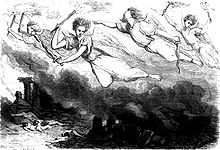Les Orientales

| French Wikisource has original text related to this article: |
Les Orientales is a collection of poems by Victor Hugo, inspired by the Greek War of Independence. They were first published in January 1829.
Of the forty-one poems, thirty-six were written during 1828. They offer a series of highly coloured tableaux depicting scenes from the eastern Mediterranean -- in particular, scenes which would set off the contrast between the (implicitly) freedom-loving Greeks and the imperialistic Ottoman Turks. The fashionable subject ensured the book's success.
Although Hugo described it as ce livre inutile de poesie pure, the general theme of the poems is a celebration of liberty, linking the Ancient Greeks with the modern world, freedom in politics with freedom in art, and reflecting Hugo's turn from the royalism of his early twenties to a rediscovery of the Napoleonic enthusiasms of his childhood (for example, see the fortieth, Lui). The poems are also intended to undermine the classicists' exclusive claim on antiquity.
The depiction of Turks in Les Orientales mixes condemnation, idealisation, and crude envy. It is often cited as being representative of the "Orientalist" attitudes in much of French literature.
The thirty-fourth poem of Les Orientales is Mazeppa. He wrote it in 1828, this poem deals with the legendary story of Ivan Mazeppa who was punished because he was caught in a love affair with a Polish nobleman's wife. The poem is organized in two parts : the first one is about Mazeppa's physical travel on the horse's back, until their death. The second part is about his spiritual travel to get back to life.
The poem was witten in 1829. The poem cites Byron and is dedicated to Louis Boulanger. The first part described the unbridled run of the horse across the plains of Russia. The second part is a kind of allegory of the creative process : "He races, he flies, he falls. He rises again, king". (Hatzfled, Helmut Literature through Art : A new approach to French Literature. Chapel Hill : University of North Carolina Press, 1952).
The horse appeared as a spiritual animal.